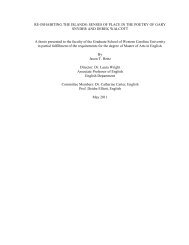SUMMERS, KAREN CRADY, Ph.D. Reading Incest - The University ...
SUMMERS, KAREN CRADY, Ph.D. Reading Incest - The University ...
SUMMERS, KAREN CRADY, Ph.D. Reading Incest - The University ...
Create successful ePaper yourself
Turn your PDF publications into a flip-book with our unique Google optimized e-Paper software.
95<br />
daughter’s identity, he gives her in marriage to Athenagoras—even before they set sail<br />
and he is reunited with his wife, thus preventing any possibility of incestuous desire on<br />
his part. By the end of the play society is set aright—and it is done so through a (male)<br />
king who acts as father to his nation as well as his daughter, trumping the destructive<br />
effects of Antiochus’ incest. In the early modern period, according to Archibald, incest<br />
can represent a “disruption of domestic and social order . . . In the ending the reunion of<br />
the spouses with representatives of both the older and the younger generation, and the<br />
presence of the protagonist’s son [son-in-law] mark the end of the disruption associated<br />
with incest, and a return to the accepted (patriarchal) social norms” (Archibald 59). That<br />
it is a man—specifically, a father, or patriarch—who, at least superficially, restores order<br />
and overcomes disruptive female sexuality signals the ‘rightness’ of patriarchy. <strong>The</strong>se<br />
two small but critical differences in the versions of the tale point the way to a possible<br />
understanding of the anxieties over changing social and class—and gender—structures in<br />
the early modern period.<br />
<strong>The</strong> double threats to the established patriarchal order of tyranny and female<br />
agency finds expression in other plays as well. First performed a dozen years after<br />
Pericles, Beaumont and Fletcher’s tragicomic A King, and No King depends on its<br />
audience’s fear of incest, whether subliminal or overt, for much of its dramatic power.<br />
Pericles’ concern over tyrannical kings is echoed in the impending tragedy building in A<br />
King, and No King, which reflects concern about the potential tyranny of patriarchy and<br />
absolute monarchy. <strong>The</strong> plot appears poised to deliver a spectacle of rape, murder, and<br />
suicide, the result of the king’s sexual obsession, loss of self-control and reason, and
















